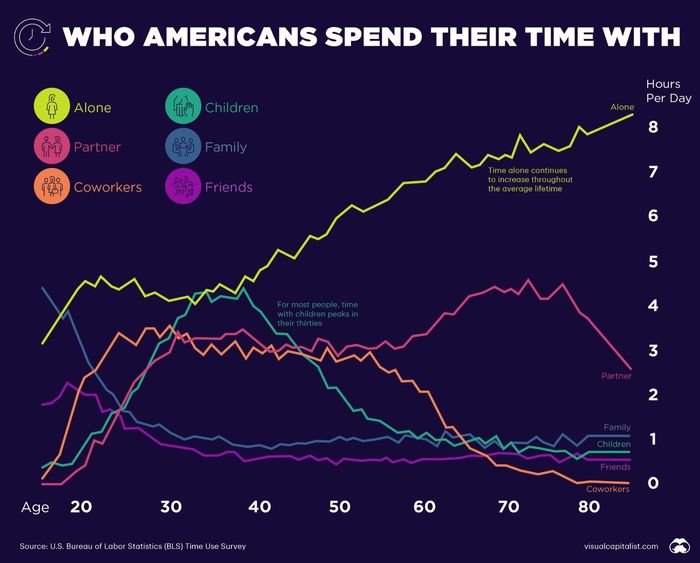“Happy” Thanksgiving.
“Merry” Christmas.
“Happy” New Year.
We’re conditioned to think that the holidays, which are about to begin, are meant to be joyous times with family and friends. TV shows, commercials, festive music and all the rest.
But this isn’t necessarily true in a country where more people are alone than ever before. I’m not just talking about living alone, which now defines 28% of all U.S. households, according to the Census Bureau, up from 13% half a century ago. I’m talking about actual time spent alone, when we are isolated and not interacting with others.
You may be surprised to learn that starting in our mid-30s, we spend more time alone than we do with friends, family or co-workers. It accelerates from there, and by the time we reach 60, according to data from the Bureau of Labor Statistics, time spent with everyone other than our significant other drops off sharply. In our 70s, the probability of losing our partner jumps, and after that our alone time—and loneliness—soars. By age 80, seniors can expect to spend more than eight hours a day alone—far more than with a partner, children, other family members and friends combined.

U.S. Bureau of Labor Statistics
This is bad for our health. Humans are physiologically social animals; we can live longer, healthier and happier lives when we are connected to others. Loneliness is so bad for us, in fact, that a new study says it can accelerate the aging process more than smoking.
“Loneliness among older adults is a silent epidemic,” says Dr. Kerry Burnight, chief executive officer of The Gerontologist Inc., which focuses on aging issues. “We were intended to connect with humans,” she tells me.
She notes the difference between being alone and being lonely.
“Being lonely means to want more social interaction than you currently have,” she says. “Or you can have nobody around and not be lonely.” Both dynamics can impact us at various times, the doctor adds.
Read: Grandparents: Forget everything you ever knew about taking care of babies
The pandemic—which hasn’t gone away, incidentally—has made the epidemic—that’s what it is—worse, by limiting social contact with others. Seniors have borne the brunt of cases and deaths, and intimidating others into staying home even more.
Other factors can exacerbate loneliness. Family members can be scattered all across the country or even around the world, and the highest inflation in four decades makes travel unaffordable for some. Living in rural areas obviously limits opportunities for human interaction as well, as does participating infrequently in religious activities. “Social Isolation [is] A Predictor of Mortality Comparable to Traditional Clinical Risk Factors,” a study of nearly 17,000 adults by the National Institutes of Health notes. It says that loneliness is “associated with a 62% higher risk of premature death in women and a 75% greater chance of an earlier death for men.”
Zoom, FaceTime and the good old-fashioned phone can alleviate this loneliness, but Dr. Burnight says these things are a poor substitute for real contact—a hug from a grandchild or a cup of coffee with a friend. It is things like this, seemingly little, that can have an outsize, positive impact.
Read: These simple food choices could reduce your risk of dementia
How to ease loneliness? Find a way to serve others through service, Burnight says. “This often has a connection component. It could be as simple as bringing lemons from your yard (she lives in Southern California) to your neighbor and sharing a cup of coffee,” or some sort of equivalent. Just do something for someone else. It helps them, and you will feel great.
“It doesn’t have to be a huge gesture,” she says. Just ask yourself every day: “How can I contribute to the world? And in doing that, it really comes right back around,” she adds.
Burnight recommends that we be proactive and creative about this. “Maybe call a friend that you lost track with years ago,” she suggests. “Or create a new tradition with a friend, where you might go and watch the lighting of a Christmas tree or a Menorah in the community. These are the two things, proactivity and creativity.”
If you are lonely, remember this. You’re not alone. Lots of us are. Chances are there’s someone you can help with a small gesture—and in doing so, help yourself as well. Now that’s a good way to get into the holiday spirit.
